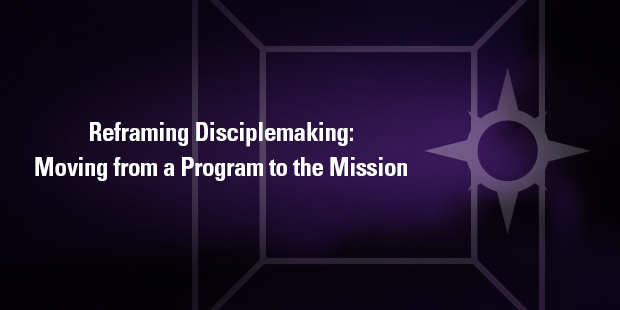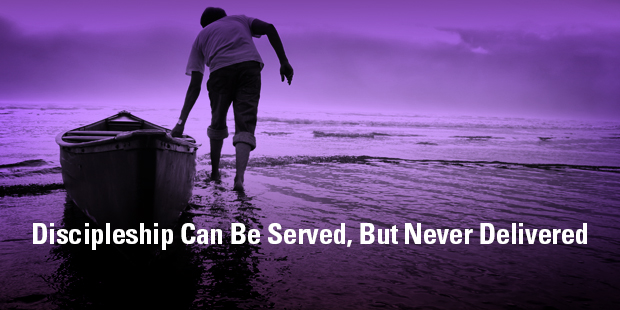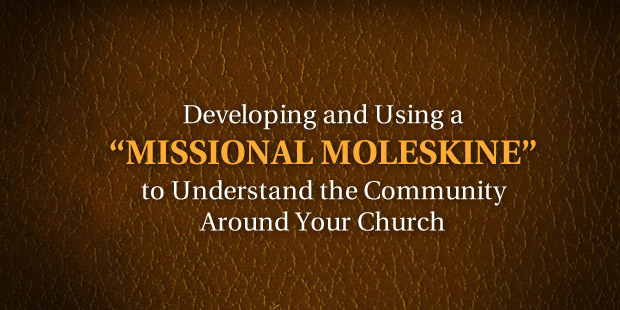More about Discipleship
-

Pastoring Your Cul-de-Sac: Collaborative Living
by VRcurator | March 31, 2020Author Reggie McNeal invites us to get off our ass (biblically speaking) with a focus on the Parable of the Good Samaritan: 25 On one occasion an expert in the law stood up to test Jesus. “Teacher,” he asked, “what must I do to inherit eternal life?” 26 “What is written in the Law?” he replied.
-

Pastoring Your Cul-de-Sac: Samaritan Living
by VRcurator | March 20, 2020Author Reggie McNeal invites us to get off our ass (biblically speaking) with a focus on the Parable of the Good Samaritan: 25 On one occasion an expert in the law stood up to test Jesus. “Teacher,” he asked, “what must I do to inherit eternal life?” 26 “What is written in the Law?” he replied.
-

The Disciplemaking Worldview: What is the Church?
by VRcurator | January 24, 2020Auxano Navigator David Putman is committed to catalyzing gospel-centered, disciple-making movements. He lives out his mission by helping others go further, faster, and longer than they ever imagined.
-

The Disciplemaking Worldview: What is a Disciple?
by VRcurator | January 2, 2020Auxano Navigator David Putman is committed to catalyzing gospel-centered, disciple-making movements. He lives out his mission by helping others go further, faster, and longer than they ever imagined.
-

Are You Leading the Whole Great Commission, or Just Half ?
by Eric Geiger | December 23, 2019Unlike business leaders who are responsible to define the mission of their organizations, church leaders don’t have that freedom or carry that burden. We have already received our mission.
-

The Disciplemaking Worldview: What is the Gospel?
by VRcurator | December 19, 2019Auxano Navigator David Putman is committed to catalyzing gospel-centered, disciple-making movements. He lives out his mission by helping others go further, faster, and longer than they ever imagined.
-

The Difference in Being WITH God or FOR God
by Trevin Wax | December 19, 2019One of my favorite moments in the Gospel of Mark is in the description of Jesus’s appointment of the disciples. In Mark 3:13-14, we read: Jesus went up the mountain and summoned those he wanted, and they came to him.
-

The Stop & Go Process of Disciple Making
by David Putman | December 17, 2019What many churches call discipleship, or disciple-making is a far cry from what Jesus had in mind when He gave us the Great Commission. What you are doing may be the very reason your church is struggling when it comes to reaching non-Christians with the gospel.
-

What if “Real Church Growth” Became the New Normal in the North American Church?
by Will Mancini | November 20, 2019If we’re honest, it’s pretty easy to see the functional Great Commission in North America: Go into all the world and make more worship attenders, baptizing them in the name of small groups, and teaching them to volunteer a few times a month. For all kinds of reasons, the words “church” and “growth” have become embarrassing when put side by side.

-

Neighborly, Part 3: The Power of Meals
by VRcurator | November 7, 2019The heart of God’s purpose for humankind is relationships – first, with God Himself; then, with one another. Arguably, there is no better place to build relationships than at the table with good food and great conversation.
-

Growing People Beyond the Baptistry
by Ed Stetzer | October 28, 2019One of the most exciting moments within the life of a church is when someone comes to know Jesus Christ as Savior. We celebrate having new believers in our churches, but are we leading them to become lifelong disciples of Jesus? Are we helping them continue through the transformation process or are we leaving them in convert mode? Conversion is not the end.
-

Neighborly, Part 2: The Power of Family
by VRcurator | October 24, 2019The heart of God’s purpose for humankind is relationships – first, with God Himself; then, with one another. Arguably, there is no better place to build relationships than at the table with good food and great conversation.
-

The Case for Healthy Church Membership
by Dan Reiland | October 24, 2019Church membership should not consist of rules to keep people out, but ramps to help people grow. Membership in a local church may seem outdated or unnecessary, but if led well, it adds great strength to your church.
-

Neighborly, Part 1: The Power of Hospitality
by VRcurator | October 10, 2019The heart of God’s purpose for humankind is relationships – first, with God Himself; then, with one another. Arguably, there is no better place to build relationships than at the table with good food and great conversation.
-

Four Benefits of a Disciple-Making Pipeline
by David Putman | October 9, 2019Let's face it; you don't have to have a disciple-making pipeline to make disciples. I would say that very few churches have an intentional pipeline.
-

This Could Change Everything in Your Church Hospitality
by Brad Brisco | October 8, 2019What is the first thing that comes to mind when you hear the word hospitality? For most people, images emerge of entertaining around meals or inviting friends into our homes for a night of fun and games. Now let’s be clear.
-

Disciplemaking Leaders: Live Out the Five Relationships of a Disciplemaker
by VRcurator | October 2, 2019Discipleship is a process that begins after conversion and continues throughout a believer’s life. Discipleship calls for our undivided attention and commitment to follow the commands of our Lord.
-

Choosing the Long Road to Somewhere Instead of the Short Road to Nowhere
by Dave Rhodes | October 1, 2019Life is filled with tensions. I’m not just talking about the negative tensions of managing relational conflict or figuring out how to pay the bills this month.
-

Reframing Disciplemaking: Moving from a Program to the Mission
by David Putman | April 29, 2019I want to respond to a frequent question, “What is a good disciple-making mission”? While I appreciate and even understand the question, a better question is “What is our disciple-making mission”? The best disciple-making mission is always going to be your unique disciple-making mission. Every church is unique! At the same time, it is true that our bias is that the big “C” Church has one and only one mission, and it is always a disciple-making mission.
-

Are We Really “Churching” As Jesus Described It?
by Brian Mavis | March 28, 2019Is Being an Externally Focused Church enough? Are We Doing What Jesus Said Matters Most? Almost a decade into our church journey of being externally focused, the city of Longmont called me (Brian). They had a problem with one of the residents.
-

5 Permissions of the Great Commission
by Philip Nation | March 27, 2019Jesus gave His commission to the early church in Matthew 28:18-20. Though it is one of several commissions given by Jesus, the church-at-large has come to call this statement: The Great Commission.
-

Four Reasons to Slow Down and Grow Well
by Rick Warren | March 26, 2019There’s no such thing as instant spiritual growth; it’s a gradual process of development. The Bible says, “So let us stop going over the basic teachings about Christ again and again.
-

Your Church Culture Must Change… Start Here
by Brad Brisco | March 22, 2019The illiterate of the 21st century will not be those who cannot read and write, but those who cannot learn, unlearn and relearn. ~ Alvin Toffler When bringing about change in the way people behave, we often need to start with questions of “why” before considering the practical issues of “how.
-

Disciple Making Takes More than a Pipeline
by David Putman | March 19, 2019“Therefore go and make disciples of all nations, baptizing them in the name of the Father and of the Son and the Holy Spirit, and teaching them to obey everything I have commanded you. And surely I am with you always, to the very end of the age” (Matthew 28:19-20).
-

What Following Jesus Takes
by Jeff Vanderstelt | March 18, 2019I’m busy. You’re busy.
-

The One Test That Reveals Your Hate for Other People
by James Emery White | March 15, 2019It was a startling headline, bordering on the feel of clickbait: “Half of Millennial Christians Say It’s Wrong to Evangelize. ” But it’s true.
-

Maturing Believers Through Process Not Events
by Philip Nation | December 30, 2018Discipleship is at the heart of the church. Jesus commanded us in Matthew 28:19 to “Go and make disciples of all nations.
-

Joining God in Your Neighborhood: Think Big and Local
by VRcurator | December 27, 2018Just for fun, ask this question to a group of church leaders: “Is an attractional model of ministry or incarnational emphasis more effective?” Then sit back, as a vigorous discussion is sure to follow. Attractional ministry implies that the church’s basic strategy for reaching the lost revolves around getting “seekers” or the “unchurched” into the church building.
-

Are You Caring for Your Community or Just Consuming From It?
by Eric Geiger | December 17, 2018In the summer of 2010, Kaye and I were on vacation in New York City and we attended services at Redeemer Presbyterian church. Before the sermon, a young man stood in front of the congregation and prayed to the Lord on behalf of the whole congregation.
-

Joining God in Your Neighborhood: Stop, Look, and Listen
by VRcurator | December 12, 2018Just for fun, ask this question to a group of church leaders: “Is an attractional model of ministry or incarnational emphasis more effective?” Then sit back, as a vigorous discussion is sure to follow. Attractional ministry implies that the church’s basic strategy for reaching the lost revolves around getting “seekers” or the “unchurched” into the church building.
-

Mobilize Disciples Like the Early Church
by Rick Warren | December 12, 2018For the past 2,000 years, Christians have been praying for the fulfillment of the Great Commission. And we’re still not there yet.
-

Why Your Lows Can be Highs When It Comes to Making Disciples
by Michael Kelley | December 5, 2018When you grow up in Texas, as I did, you were schooled up in the stories of the Alamo. It’s legendary – a small group of freedom fighters that took their stand against incredible odds in the small mission in San Antonio (of course, I only later found out that these “heroes” were not quite the upstanding patriots I thought they were as a kid, but I digress…) Stories of Davy Crockett, Jim Bowie, and William Barrett Travis were the stuff of legend.
-

What to Do When Your Faith Goes Stale
by Michael Kelley | October 24, 2018We never had the problem of stale chips and crackers when I was a kid. But that’s because I grew up in a part of the country where there was humidity about 3 days out of the year.
-

How to Eat on Purpose (for the Gospel)
by Jeff Vanderstelt | October 23, 2018If you and others around you are going to grow in gospel fluency, you need consistent immersion in a gospel-speaking community. This needs to be much more than a weekly gathering of the church where the gospel is preached (though it should include this).
-

Disciplemaking Leaders: Pursue a C.L.O.S.E.R. Walk with God
by VRcurator | October 18, 2018Discipleship is a process that begins after conversion and continues throughout a believer’s life. Discipleship calls for our undivided attention and commitment to follow the commands of our Lord.
-

5 Keys to Cultivating an Environment of Growth
by Dan Reiland | October 17, 2018When it comes to faith, it’s our job as leaders to make what is intangible and supernatural, practical and assessable. That’s not easy.
-

The Importance of Being Sent
by Philip Nation | October 10, 2018In the New Testament epistles and the Revelation of John, the arrival of the Messiah in the world is seen as a part of the sending motif in Scripture. Noted from John’s first epistle, insight is given into the motivation for God’s sending activity.
-

Why Minding Community is Better than Finding It
by James Emery White | October 10, 2018One of the great myths of relational life is that community is something found. In this fairy tale, community is simply out there – somewhere – waiting to be discovered like Prince Charming finding Cinderella.
-

Developing the Mature Mind of Christ
by Rick Warren | October 5, 2018God wants you to grow up. “God wants us to grow up, to know the whole truth and tell it in love – like Christ in everything” (Ephesians 4:15 The Message).
-

The Critical Importance of Leadership Development in Discipleship
by Trevin Wax | October 1, 2018“Your church is designed to lead, designed to disciple leaders who are, by God’s grace, commanded to disciple people in all spheres of life. ” That sentence is near the beginning of Eric Geiger and Kevin Peck’s excellent book on leadership development in the local church.
-

The Real Meaning of Community and Mission
by Dustin Willis | March 27, 2018My wife and I have a rugged wooden farm table. It’s not impressive—there are scratches, stains, and some cracks that make you wonder if it can even hold another plate.
-

4 Principles of a Multiplying Church
by Alan Briggs | March 18, 2018I find myself talking a lot about discipleship these days. It is my passion.
-

How Discipleship Becomes More than a Class: Embodiment
by VRcurator | March 16, 2018The story of discipleship in the beginning days of the church was lived out as those early Christians went about their lives – telling family, friends, masters, slaves, soldiers about their new lives in Christ. In other words, they lived out their faith every day in the relationships they already had with others.
-

Four Reasons to Not Give Up on Small Groups
by Rick Warren | March 13, 2018We may attract attenders through preaching, but disciples are made in small groups. When you’re leading a campaign, like 40 Days of Prayer, or anytime in the future as you lead your congregation toward a deeper relationship with Jesus, you’ll want to explain to your members why small groups are so important to spiritual growth and why they are more than just a Bible study.
-

Why Heaven Matters to Discipleship
by Trevin Wax | March 7, 2018Have you heard the phrase, “They’re so heavenly minded they’re of no earthly good!” It’s usually a slur against Christians whose heads are “in the clouds” all the time, too focused on heavenly matters to be of any help for the practical side of life. The idea is that if you spend too much time looking to the future, you’ll miss out on making a real difference in the present.
-

Nine Actions that Produce Lasting Growth
by Brandon Cox | March 6, 2018Spiritual disciplines… that phrase has such a strange ring to it. We think of “discipline” as correction, or perhaps as greuling hard work that never ends.
-

6 Moments to Engage Families in Small Groups
by Bryan Rose | March 5, 2018It happened again. You just made the same small group announcement.
-

How Discipleship Becomes More Than a Class: Influence
by VRcurator | March 2, 2018Does your church only see discipleship as a class to be taken or a study to attend? The story of discipleship in the beginning days of the church was lived out as those early Christians went about their lives – telling family, friends, masters, slaves, soldiers about their new lives in Christ. In other words, they lived out their faith every day in the relationships they already had with others.
-

Do You Have a Blueprint for Ministry Model Change?
by VRcurator | December 22, 2017Looking back, 2016 was truly a landmark year. From Olympics to Elections to Chewbacca Mom, the year contained moments worth sharing and remembering.
-

The Real Measure of Making Disciples
by VRcurator | December 8, 2017Looking back, 2016 was truly a landmark year. From Olympics to Elections to Chewbacca Mom, the year contained moments worth sharing and remembering.
-

The Sacred Calling of the Secular Workplace
by Ed Stetzer | October 31, 2017There is a growing movement of churches and organizations (including here at Wheaton College, where I now work) that are seeking to help Christians see their jobs—whatever they may be—as a calling and something that can be used for the growth of the Kingdom of God. And rightly so! The unfortunate divide between “secular work” and “sacred work” has lasted too long.
-

A Case for Analog Disciple Making
by Trevin Wax | October 25, 2017Is digital on the way out? Is analog on the way in? A new book by David Sax, The Revenge of Analog: Real Things and Why They Matter, focuses on recent movement away from digital technology and back toward "real things" like vinyl records, board games, hardcover books, and face-to-face education. I've experienced this phenomenon.
-

How to Align What You Desire with What You Believe
by Michael Kelley | October 24, 2017Living things grow. It’s true for every organic life form, but it’s also true of us spiritually.
-

2 Keys for Doing Life Together
by VRcurator | October 20, 2017Dietrich Bonhoeffer, writing in The Cost of Discipleship, states, “On two separate occasions Peter received the call ‘Follow me. ’ It was the first and last word Jesus spoke to His disciple.
-

These Three Things Are Not Disicipleship
by Philip Nation | October 19, 2017If you want to solve a problem, you have to know there is a problem. When it comes to discipleship, we need to understand the bad definitions that persist in order to propose a better way.
-

Jesus Builds His Church Through His Disciples
by Ed Stetzer | October 18, 2017When John Piper was pastor, Bethlehem hosted a church-planting conference with Global Church Advancement. I was on deck to speak next as Piper talked about church planting on video.
-

Seven Truths About Authentic Discipleship
by Carey Nieuwhof | October 11, 2017One of the ways you know you’re making progress is that you stop having the same discussion over and over again. If you’re discussing the same issues on your team or at home year after year, you’re probably stuck.
-

How Do Groups Fit into the Overall Strategy of Your Church?
by Eric Geiger | October 10, 2017One of the biggest takeaways from the research behind our book Transformational Groups is the need for churches to be more clear and focused in their group strategy. Church leaders must know how their groups (classes, Bible fellowships, etc.
-

Every Action Must Follow This One Thing
by VRcurator | October 6, 2017How can you help your church transition from passive worship-service attenders to active Jesus-serving disciplers? The failure to follow the Lord’s command to make disciples in Matthew 28:18-20 stands as possibly the single most glaring act of negligence by the Church today. This neglect has lead to many well-intentioned families to think of themselves as an audience to be entertained at the church, rather than an army to be deployed from church.
-

Four Keys for Improving Your Assimilation Process
by Church Community Builder | May 11, 2017If you ask 100 church leaders to define assimilation, you’ll probably get 100 different answers. Some might say it’s all about creating relationships.
-

How to Live for Jesus in Three Key Environments
by VRcurator | March 24, 2017Ask, “What is discipleship?” in a group of church leaders, and if honest answers were forthcoming, the most frequently associated word would be “class” or “group. ” While classes and groups may supplement the discipleship process, attendance alone is insufficient.
-

2 Steps to Balance Your Church’s Discipleship Deficit
by Ed Stetzer | March 20, 2017The topic of discipleship is one of increasing importance among many believers, and rightfully so. This topic deserves our attention even more today as church leaders realize there is a “discipleship deficit.
-

Discipleship Can Be Served, But Never Delivered
by James Emery White | March 13, 2017Discipleship matters. The goal is not a crowd, but rather a core of committed Christ followers who are fleshing out the life of Christ at work, in their marriage, their parenting, their finances, their thinking, their politics, their… … everything.
-

Intentionally Train Disciples to Do What Jesus Did
by VRcurator | March 10, 2017How do I develop a discipleship process while acknowledging the organic nature of making disciples? Dietrich Bonhoeffer, writing in The Cost of Discipleship, states, “On two separate occasions Peter received the call ‘Follow me. ’ It was the first and last word Jesus spoke to His disciple.
-

4 Actions for a Church-wide Focus on Making Disciples
by Ed Stetzer | March 2, 2017One of the more common roles in a church is discipleship leader. Recently, as I was updating Planting Missional Churches for its next edition, Daniel Im and I listed discipleship coordinator as one of the seven key roles in a new church.
-

Three Practices to Help Reframe the Heart of a Disciplemaker
by Bryan Rose | February 21, 2017When asked, there are many reasons church leaders give for lack of effectiveness in making disciples. Here are a few common responses: “We have uncommitted volunteers” “We reach many distracted families” “We suffer from ineffective curriculum” “We find ourselves with unavailable leadership” “We are experiencing diminishing giving” “We need to get beyond our under-performing staff” “We are stuck through over-complex processes” While the above may be resonant, they are likely not the actual reason your church continues to struggle to make disciples.
-

3 Reasons Groups MUST Be a Big Deal
by Eric Geiger | November 2, 2016While one person can make a significant impact on each of us, we tend to be much more influenced by groups of people. Here is a fascinating example: The Petrified Forest National Park in Arizona has often faced a crisis as people can steal petrified wood at an alarming rate.
-

Five Spiritual Formation Lessons from the Megachurch
by Dan Reiland | October 31, 2016Very large churches are sometimes accused of being shallow. A mile wide and an inch deep.
-

Creating Opportunities for Discipleship
by Dave Bair | October 27, 2016Church leaders have been complaining lately that their church is declining, or that Church in general is shrinking. However, at Church Community Builder we work with some churches who are thriving and asking for our help in growing well.
-

Beginning Your Discipleship Journey in a Weekend-Only Culture
by VRcurator | October 21, 2016Below is a weekly series posting content from one of the most innovative content sources in the church world: SUMS Remix Book Summaries for church leaders. SUMS Remix takes a practical problem in the church and looks at it with three solutions; and each solution is taken from a different book.
-

It’s Time to Stop Campaigning and Start Discipling
by Todd McMichen | October 17, 2016Recently, Auxano was engaged by Mainstreet Church in the greater Toledo, Ohio area to help rethink how they would continue to fund their vision. Under the leadership of Lead Pastor, Marty Pennington, the church had taken a leap of faith, constructed a new campus, and relocated to the new facilities enabling them to build relationships that move more people to full devotion to Christ.
-

7 Truths About Authentic Discipleship
by Carey Nieuwhof | October 13, 2016One of the ways you know you’re making progress is that you stop having the same discussion over and over again. If you’re discussing the same issues on your team or at home year after year, you’re probably stuck.
-

Back to School Lessons for Personal Spiritual Growth
by Michael Kelley | October 12, 2016This fall marked the beginning of another school year in the Kelley household. This one’s a bit different than in years past because this year, we’ve got a middle schooler.
-

Six Keys for Whole-Church Discipleship
by Brandon Cox | October 11, 2016I grew up attending church a lot. I was in a church classroom a lot.
-

When You Need a Discipleship Strategy But Don’t Know Where to Begin
by VRcurator | October 7, 2016Below is a new weekly series posting content from one of the most innovative content sources in the church world: SUMS Remix Book Summaries for church leaders. SUMS Remix takes a practical problem in the church and looks at it with three solutions; and each solution is taken from a different book.
-

Every Leader’s 3-Step Formula for Multiplication
by Jeff Meyer | October 3, 2016And the things you have heard me say in the presence of many witnesses entrust to reliable people who will also be qualified to teach others. 2 Timothy 2:2 What qualifies someone to teach others? Advanced biblical training? Theological degrees? Titles? Anyone can teach.
-

3 Ways We Miss Seeing Discipleship as Church Strategy
by Eric Geiger | March 30, 2016Every church should embrace the mission of making disciples and implement a strategy to accomplish that mission. Because the mission of a local church is to make disciples, a strategy is how the church is designed to make disciples.
-

2 Necessities for Health in Discipleship AND Evangelism
by Dan Reiland | March 28, 2016Which is more important discipleship or evangelism? It’s not a trick question, but it is a difficult one in practice. Every church leader has a unique wiring that creates a personal bias toward either discipleship or evangelism.
-

How Thinking Can Change the Way You Think About Discipleship
by Trevin Wax | March 23, 2016If you are a disciple-maker, you should want people to think like you. I realize that statement may come across as counter-cultural in our day.
-

9 Ways to Uncomplicate the Discipleship Process
by Philip Nation | March 16, 2016“Simplicity is the ultimate sophistication. ” -Leonardo da Vinci Discipleship is at the heart of the church’s existence.
-

4 Foundations to a Simple Discipleship Strategy
by Eric Geiger | March 14, 2016As a football season is about to begin, imagine a head coach stands in front of the team he leads and, with great passion, declares, “Here is our strategy. We are going to win! We are about winning! Let’s go win!” The team breaks from the huddle with no idea how they will win.
-

Two of the Best Questions to Ask to Determine if Your Small Groups are Working
by Dan Reiland | October 27, 2015A couple days ago a church leader asked me if I thought small groups were kind of “old school and over with?” He continued to suggest that small groups were now passé and wanted to know the new cutting edge innovative thing. I pressed in further in order to better understand his question and discovered that small groups were not working at his church.
-

How to Point the Way and Clear the Path to Effective Discipleship
by Steven Furtick | October 19, 2015I get asked all the time how we do discipleship at Elevation. Related to this question, I also get asked how we follow up with new believers.
-

Doing Life Together with Others Follows Christ’s Example
by Ed Stetzer | October 16, 2015In a world that is pushing against community, the church must pursue authentic community. Community matters.
-

4 Habits of a Discipling Leader
by Dave Bair | October 8, 2015Over the years, I have worked in a variety of fields, gaining exposure to many different industries. Each industry has unique jargon.
-

You Mass Produce Cars, Not Disciples
by Ed Stetzer | October 7, 2015Disciples Need Leaders I wonder how many church leaders don’t even realize the success of ongoing discipleship depends partly on how well they develop leaders. God didn’t design the church to have one person lead everyone else in spiritual formation—far too often the model of evangelical churches.
-

Developing a “Missional Moleskine” to Understand the Community Around Your Church
by Timmy Brister | October 2, 2015Several years ago, I was leading a group from our church in the formation of a launch team for our first daughter church plant. In my series on “cultivating community contacts,” I shared about the “missional moleskine” (not to be confused with the memory moleskine).









